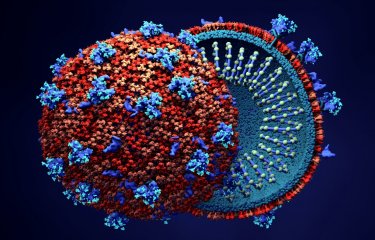Like other factors such as age, sex and genetics, smoking has a major impact on immune responses. This is the finding recently made by a team of scientists at the Institut Pasteur using the Milieu Intérieur cohort of 1,000 healthy volunteers, established to understand variability in immune responses. In addition to its short-term impact on immunity, smoking also has long-term consequences. For many years after they have quit the habit, smokers are left with effects on some of their bodies' defense mechanisms acquired while smoking. These findings, which for the first time reveal a long-term memory of the effects of smoking on immunity, were published in the journal Nature on February 14, 2024.
Individuals' immune systems vary significantly in terms of how effectively they respond to microbial attacks. But how can this variability be explained? What factors cause these differences? "To answer this key question, we set up the Milieu Intérieur cohort comprising 1,000 healthy individuals aged 20 to 70 in 2011," comments Darragh Duffy, Head of the Translational Immunology Unit at the Institut Pasteur and last author of the study. While certain factors such as age, sex and genetics are known to have a significant impact on the immune system, the aim of this new study was to identify which other factors had the most influence."
The scientists exposed blood samples taken from individuals in the Milieu Intérieur cohort to a wide variety of microbes (viruses, bacteria, etc.) and observed their immune response by measuring levels of secreted cytokines(1). Using the large quantities of data gathered for individuals in the cohort, the team then determined which of the 136 investigated variables (body mass index, smoking, number of hours' sleep, exercise, childhood illnesses, vaccinations, living environment, etc.) had the most influence on the immune responses studied. Three variables stood out: smoking, latent cytomegalovirus infection(2) and body mass index. "The influence of these three factors on certain immune responses could be equal to that of age, sex or genetics," points out Darragh Duffy.
As regards smoking, an analysis of the data showed that the inflammatory response, which is immediately triggered by infection with a pathogen, was heightened in smokers, and moreover, the activity of certain cells involved in immune memory was impaired. In other words, this study shows that smoking disrupts not only innate immune mechanisms, but also some adaptive immune mechanisms.

A comparison of immune responses in smokers and ex-smokers revealed that the inflammatory response returned to normal levels quickly after smoking cessation, while the impact on adaptive immunity persisted for 10 to 15 years. This is the first time it has been possible to demonstrate the long-term influence of smoking on immune responses.
Darragh DuffyHead of the Translational Immunology Unit at the Institut Pasteur and last author of the study
Basically, the immune system appears to have something resembling a long-term memory of the effects of smoking. But how? "When we realized that the profiles of smokers and ex-smokers were similar, we immediately suspected that epigenetic processes were at play(3)," says Violaine Saint-André, a bioinformatician in the Institut Pasteur's Translational Immunology Unit and first author of the study. "We demonstrated that the long-term effects of smoking on immune responses were linked to differences in DNA methylation(4) – with the potential to modify the expression of genes involved in immune cell metabolism – between smokers, ex-smokers and non-smokers." It therefore appears that smoking can induce persistent changes to the immune system through epigenetic mechanisms.

This is a major discovery elucidating the impact of smoking on healthy individuals' immunity and also, by comparison, on the immunity of individuals suffering from various diseases.
Violaine Saint-AndréBioinformatician in the Institut Pasteur's Translational Immunology Unit and first author of the study
(1) proteins secreted by a large number of immune cells to communicate among themselves and participate in immune defense.
(2) a virus in the herpes family that is often asymptomatic though dangerous to fetuses.
(3) changes in DNA that affect how genes are expressed, i.e. how they are used by cells.
(4) methylation is a type of chemical modification. Methyl groups position themselves on DNA, changing the way in which the genome is read in the cell.
Source
Smoking changes adaptive immunity with persistent effects, Nature, February 14, 2024
Violaine Saint-André1,2*, Bruno Charbit3, Anne Biton2, Vincent Rouilly4, Céline Possémé1, Anthony Bertrand1,5, Maxime Rotival6, Jacob Bergstedt6,7,8, Etienne Patin6, Matthew L. Albert9, Lluis Quintana-Murci6,10, Darragh Duffy1,3*, and the Milieu Intérieur Consortium
1Translational Immunology Unit, Department of Immunology, Institut Pasteur, Université Paris Cité, Paris 75015, France.
2Bioinformatics and Biostatistics HUB, Department of Computational Biology, Institut Pasteur, Université Paris Cité, Paris 75015, France.
3Cytometry and Biomarkers UTechS, Center for Translational Research, Institut Pasteur, Université Paris Cité, Paris 75015, France.
4DATACTIX, Paris, France.
5Frontiers of Innovation in Research and Education PhD Program, LPI Doctoral School, Université Paris Cité, Paris, France.
6Institut Pasteur, Université Paris Cité, CNRS UMR2000, Human Evolutionary Genetics Unit, Paris 75015, France.
7Institute of Environmental Medicine, Karolinska Institutet, Stockholm, Sweden.
8Department of Medical Epidemiology and Biostatistics, Karolinska Institutet, Stockholm, Sweden.
9HIBIO, San Francisco, California, USA.
10Chair Human Genomics and Evolution, Collège de France, Paris 75005, France.
*Corresponding author





